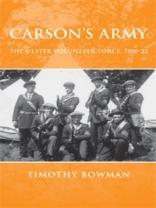The Ulster Volunteer Force (UVF) was established in January 1913, as a militant expression of Ulster Unionist opposition to the Third Home Rule Bill. Academic historians have tended to overlook Ulster Loyalism. This book provides the first comprehensive study of the UVF in this period, considering in detail the composition of the officer corps, the marked regional recruiting differences, the ideologies involved, the arming and equipping of the UVF and the contingency plans made by UVF Headquarters in the event of Home Rule being imposed on Ulster. Using previously neglected sources, it demonstrates that the UVF was better armed and less well-trained, with the involvement of fewer British army officers than previous historians have allowed, and suggests that the UVF was quite capable of seizing control of Ulster and installing the Ulster Provisional Government in the event of Home Rule being implemented in 1914.
This book will be essential reading for military and Irish historians and their students, and will interest any general reader interested in modern paramilitary forces.
Inhoudsopgave
List of tables
Acknowledgements
List of abbreviations
Map
Introduction
Chapter 1: The Origins of Ulster Unionist militancy, 1885-1913
Chapter 2: ‘An armed democracy’? The social composition and ideological basis of the UVF
Chapter 3: Command, control and military efficience
Chapter 4: Parades and propaganda: The public face of the UVF
Chapter 5: Arms, equipment and finance
Chapter 6: War and decline, 1914-1919
Chapter 7: The revival and demise of the UVF, 1920-22
Conclusion
Bibliography
Over de auteur
Timothy Bowman is Lecturer in modern British military history at the University of Kent












